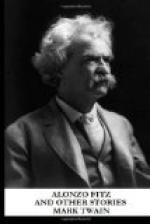[It had been my intention, at this point, to mention names and give illustrative specimens, but indications observable about me admonished me to beware of particulars and confine myself to generalities.]
No fact is more firmly established than that lying is a necessity of our circumstances—the deduction that it is then a Virtue goes without saying. No virtue can reach its highest usefulness without careful and diligent cultivation—therefore, it goes without saying that this one ought to be taught in the public schools—at the fireside—even in the newspapers. What chance has the ignorant, uncultivated liar against the educated expert? What chance have I against Mr. Per— against a lawyer? Judicious lying is what the world needs. I sometimes think it were even better and safer not to lie at all than to lie injudiciously. An awkward, unscientific lie is often as ineffectual as the truth.
Now let us see what the philosophers say. Note that venerable proverb: Children and fools always speak the truth. The deduction is plain —adults and wise persons never speak it. Parkman, the historian, says, “The principle of truth may itself be carried into an absurdity.” In another place in the same chapter he says, “The saying is old that truth should not be spoken at all times; and those whom a sick conscience worries into habitual violation of the maxim are imbeciles and nuisances.” It is strong language, but true. None of us could live with an habitual truth-teller; but, thank goodness, none of us has to. An habitual truth-teller is simply an impossible creature; he does not exist; he never has existed. Of course there are people who think they never lie, but it is not so—and this ignorance is one of the very things that shame our so-called civilization. Everybody lies—every day; every hour; awake; asleep; in his dreams; in his joy; in his mourning; if he keeps his tongue still, his hands, his feet, his eyes, his attitude, will convey deception—and purposely. Even in sermons—but that is a platitude.
In a far country where I once lived the ladies used to go around paying calls, under the humane and kindly pretense of wanting to see each other; and when they returned home, they would cry out with a glad voice, saying, “We made sixteen calls and found fourteen of them out”—not meaning that they found out anything against the fourteen—no, that was only a colloquial phrase to signify that they were not at home—and their manner of saying it—expressed their lively satisfaction in that fact. Now, their pretense of wanting to see the fourteen—and the other two whom they had been less lucky with—was that commonest and mildest form of lying which is sufficiently described as a deflection from the truth. Is it justifiable? Most certainly. It is beautiful, it is noble; for its object is, not to reap profit, but to convey a pleasure to the sixteen. The iron-souled truth-monger would plainly manifest, or even utter the fact, that he didn’t want to see those people—and he would be an ass, and inflict a totally unnecessary pain. And next, those ladies in that far country—but never mind, they had a thousand pleasant ways of lying, that grew out of gentle impulses, and were a credit to their intelligence and at honor to their hearts. Let the particulars go.




